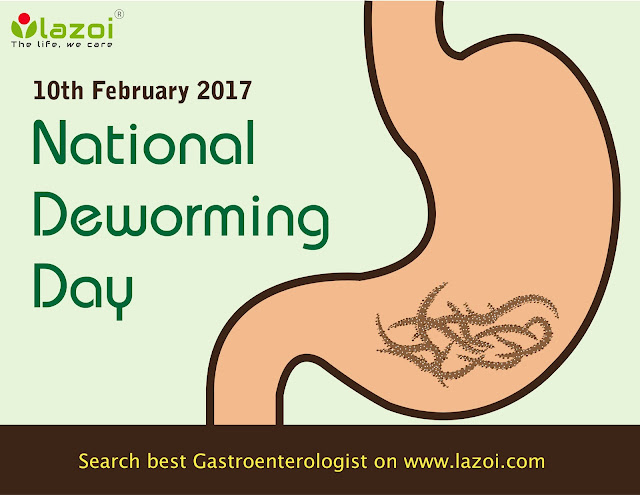World Health Organization estimates that 241 million children between the ages of 1 and 14 are at risk of parasitic intestinal worms in India, known as Soil-Transmitted Helminths (STH). These children represent approximately 68% of children in this age-group and approximately 28% of the number of children estimated to be at-risk of STH infections globally.
STH transmission
STH transmission
- There are three main types of STH that infect people: roundworm, whipworm and hookworms.
- Adult worms live in human intestines for food and survival where they produce thousands of eggs each day.
- Infected people who defecate outdoors spread worm eggs in their faeces.
Subsequently, the eggs contaminate the soil which can spread infection in several ways.
Symptoms of infection
- Regular treatment of at-risk populations will reduce the intensity of infection and protect infected individuals from morbidity.
- The greater the amount of worms in an individual (intensity), the more symptoms the infected individual will have.
- People with light infections usually have no symptoms.
- Heavier infections can cause a range of symptoms including diarrhoea, abdominal pain, and weakness.
- Loss of appetite.
Prevention of infection
Infections can be prevented by taking precautions, including:
- Using sanitary toilets, not defecating outside.
- Hand-washing, particularly before eating and after using toilets.
- Wearing slippers and shoes.
- Washing fruits and vegetables in safe and clean water.
- Properly cooking food.
Deworming treatment given to children
Albendazole and Mebendazole are the names of the deworming drugs used by the Government of India and is a safe treatment for intestinal worms. The recommended dosage is as follows:
- For children of 2 years and upwards - : 1 tablet Albendazole (400 mg) or 1 tablet Mebendazole (500 mg)
- For children of age 1 – 2 years - ? tablet of Albendazole (400 mg) or 1 tablet of Mebendazole (500 mg)
Appropriate administration of tablets to children between the ages of 1 and 3 years is important. The tablet should be broken and crushed between 2 spoons, then safe water added to help administer the drug. The older children should chew the tablet and if required should consume some water.
Side effects of deworming treatment
Side effects of deworming treatment
The deworming treatment has very few side effects. There may be some mild side effects like dizziness, nausea, headache, and vomiting, all likely due to the worms being passed through the child’s body. These side effects disappear after some time. Side effects are usually experienced by children with high infections. If symptoms do not go away within 24 hours, or if they are very severe, the child is probably experiencing something unrelated to the treatment and should be taken to a general physician immediately.
Benefits of deworming treatment
Rigorous studies have shown that deworming has a significant impact on the health, education and livelihoods of treated children. Outcomes of deworming can include:
- Decreases anaemia and improves nutrition
- Increases growth and weight gain
- Improves cognition and mental and physical development
- Increases resistance to other infections
- Supports more frequent school attendance
- Improves children’s ability to learn better and be more active in school
- Increase hours worked and wages earned in the long-run in adulthood
Deworming also has important spill-over effects, meaning that other members of the community who do not receive treatment benefit, as there are fewer worms in the environment. This is especially important for children who are too young to be treated but for whom worms can greatly impair cognitive development.

No comments:
Post a Comment